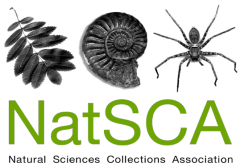This workshop, organised by NatSCA and NHM London, will take you through the steps required to digitise and share specimen occurrence data (‘what, where, when, who’), and understand some of the community standards used by the Global Biodiversity Information Facility (GBIF). A mixture of talks and exercises will provide achievable solutions and help delegates make the case for future investment. Supplementary online seminars will also be included and given on later dates to deliver more in-depth training and help answer any specific questions.
The workshop is aimed at people working with natural sciences collections who have a background in the subject but little or no experience of data mobilisation. Its focus is biological collections.
Delivered for NatSCA by the NHM’s Digitisation team as part of DiSSCo UK.
Lunch is included. Booked participants will be asked if they have any dietary requirements.
Members: £30
Non-members: £50
NatSCA members: please email membership@natsca.org for your membership code.
Non-members: you can join NatSCA for £20, the price difference between this course’s member and non-member rate and enjoy benefits such as our lunchtime chats once a month and the journal! Please email training@natsca.org to find out more.
Numbers are very limited so please book early to avoid disappointment.
When you book a ticket to this workshop NatSCA will collect some personal data such as your name and contact email address, which will be processed in accordance with NatSCA’s and the Natural History Museum’s privacy notice and data handling policy, and will be used for further communication regarding the remaining seminars of the course and for a final survey, which will be used to understand sector needs in relation to digitisation capability, and provide information about how these may be supported through the DiSSCo UK project, that aims to integrate research infrastructure that is open to all. The Natural History Museum believes that the use of this is necessary for the legitimate interest of the organisation on the grounds that the Museum leads for the UK in the DiSSCo consortium and is responsible for organising the UK governance for this work, including keeping stakeholders with natural history collections in the UK engaged and informed, and understanding their needs. This information will not be used for anything other than this purpose. The data will be retained for a period of five years. If you would like more information about how the Natural History Museum handles your information, including your Data Subjects Rights, please see our full privacy notice here.


